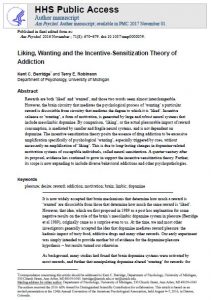Mental Health
Liking, Wanting and the Incentive-Sensitization Theory of Addiction
 Full Article Title: Liking, Wanting and the Incentive-Sensitization Theory of Addiction
Full Article Title: Liking, Wanting and the Incentive-Sensitization Theory of Addiction
Open Access: Yes
Abstract
Rewards are both ‘liked’ and ‘wanted’, and those two words seem almost interchangeable. However, the brain circuitry that mediates the psychological process of ‘wanting’ a particular reward is dissociable from circuitry that mediates the degree to which it is ‘liked’. Incentive salience or ‘wanting’, a form of motivation, is generated by large and robust neural systems that include mesolimbic dopamine. By comparison, ‘liking’, or the actual pleasurable impact of reward consumption, is mediated by smaller and fragile neural systems, and is not dependent on dopamine. The incentive-sensitization theory posits the essence of drug addiction to be excessive amplification specifically of psychological ‘wanting’, especially triggered by cues, without necessarily an amplification of ‘liking’. This is due to long-lasting changes in dopamine-related motivation systems of susceptible individuals, called neural sensitization. A quarter-century after its proposal, evidence has continued to grow in support the incentive-sensitization theory. Further, its scope is now expanding to include diverse behavioral addictions and other psychopathologies.
